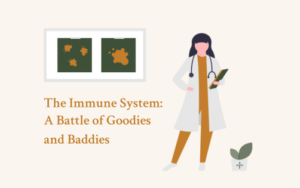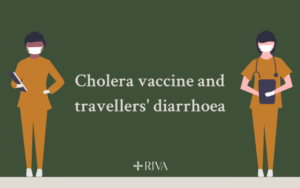Shingles and Chickenpox
Shingles and chickenpox are both caused by the same virus, the varicella-zoster virus. Chickenpox is a common childhood disease that causes a rash and fever, while shingles is a painful condition that affects adults.
What is Chickenpox?
Chickenpox is a highly contagious viral infection that typically affects children under the age of 12. It is characterised by a rash of itchy blisters that break out all over the body, accompanied by a fever, headache and fatigue. Chickenpox is spread through direct contact with the rash or through airborne droplets from an infected person’s cough or sneeze. The virus can also be transmitted indirectly by touching objects contaminated with the virus.
Chickenpox typically lasts for 7-10 days, during which time the rash will go through several stages, from red bumps to fluid-filled blisters to scabs. Most people recover fully from chickenpox without any complications, although in rare cases, serious complications such as pneumonia, brain inflammation, or bacterial infections may occur.
How is Chickenpox Treated?
Treatment for chickenpox typically involves managing the symptoms, such as with antihistamines and calamine lotion to relieve itching and using paracetamol to reduce fever and pain. Ibuprofen should not be used as it can cause a serious skin reaction.
Chickenpox and Pregnancy
If a woman becomes infected with chickenpox during pregnancy, it can cause serious complications for both the mother and baby. Pregnant women should take precautions to avoid contracting chickenpox.
Here are some important things that pregnant women should know about chickenpox:
- Chickenpox can be dangerous for pregnant women: If a pregnant woman gets chickenpox, she is at risk of developing complications such as pneumonia or encephalitis. These complications can be life-threatening for both the mother and baby.
- Chickenpox can cause birth defects: If a woman contracts chickenpox during the first 20 weeks of pregnancy, it can cause birth defects in the baby, such as limb abnormalities, eye problems, and neurological problems.
- Chickenpox can be passed onto the baby: If a pregnant woman contracts chickenpox during the last few weeks of pregnancy, the baby can be born with chickenpox. This is known as congenital varicella syndrome, and it can cause serious complications for the baby.
- Vaccination can prevent chickenpox: If you are pregnant and have not had chickenpox, you should consider getting vaccinated before getting pregnant. The chickenpox vaccine is safe and effective, and it can protect you and your baby from complications associated with chickenpox.
- Treatment options are available: If you do contract chickenpox during pregnancy, there are treatment options available to help manage symptoms and reduce the risk of complications. Antiviral medications can be prescribed by your doctor, and supportive care can also help relieve symptoms.
What is Shingles?
Shingles, also known as herpes zoster, is a viral infection that occurs when the varicella-zoster virus reactivates in the body after lying dormant for many years. This reactivation typically occurs in people over the age of 50 or those with weakened immune systems. Shingles is characterised by a painful rash that usually appears on one side of the body, often in a band or stripe.
The rash typically develops into fluid-filled blisters that scab over in 7-10 days and gradually disappear over several weeks. In addition to the rash, shingles may cause fever, headache, chills, and fatigue. Shingles can also cause severe pain, itching, and nerve damage, especially if it affects the face or eyes. The pain associated with shingles can be severe and can persist for months or even years after the rash has healed. This chronic pain condition is known as postherpetic neuralgia (PHN).
Shingles is not contagious, but it can be transmitted to people who have not had chickenpox or the chickenpox vaccine. If a person, who has not had chickenpox or the vaccine, comes into contact with the fluid from shingles blisters, they may develop chickenpox rather than shingles.
How is Shingles Treated?
Treatment for shingles typically involves antiviral medications to reduce the severity and duration of the illness, as well as pain medications to manage the pain. Antivirals work best if taken within the first 3 days of symptoms starting.
What is the Relationship Between Shingles and Chickenpox?
Shingles is caused by the varicella-zoster virus, the same virus that causes chickenpox. After a person recovers from chickenpox, the virus remains dormant in the body’s nerve cells. In some people, the virus can reactivate later in life and cause shingles.
People who have never had chickenpox or received the chickenpox vaccine can also develop chickenpox if they come into contact with the fluid from shingles blisters. However, a person cannot develop shingles from contact with someone who has shingles. Instead, they must have had chickenpox in the past or received the chickenpox vaccine.
Can Chickenpox and Shingles be Prevented?
The best way to prevent shingles is to get vaccinated with the shingles vaccine, which is recommended for people over the age of 50. The vaccine can reduce the risk of developing shingles by 51% and can also reduce the risk of developing PHN if shingles does occur. In addition, the chickenpox vaccine is recommended for all children to prevent them developing chickenpox and potentially developing shingles in later life.
RIVA Immunisation Courses
Immunisation courses are an important part of the ongoing education and development of healthcare professionals involved in the administration of vaccines. By staying up-to-date with the latest developments in immunisation practice, healthcare professionals can ensure that they are providing safe and effective care to their patients. RIVA immunisation courses are led by trainers who are subject-specialists, and passionate about empowering healthcare professionals. Our courses are designed to educate and inspire, helping staff to do their jobs with clarity and confidence. RIVA celebrates the people on the frontline of the health industry. Finding comprehensive immunisation training doesn’t need to be difficult. To work with a company that values nurses and other healthcare professionals, get in touch with RIVA today.





